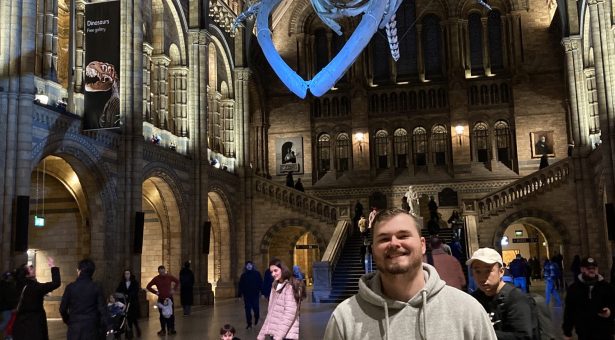James enhances his skill set at the Natural History Museum

James Docherty, an NRPDTP student based at QIB, is interested in pursuing a career related to bioinformatics and so wanted to use his PIPS to help with this. James applied for an internship at the Natural History Museum (NHM), led by Matt Clark, who is a Research Leader at the NHM, and the Genomics Theme Leader. James wanted to improve his lab and bioinformatics skillset to conduct effective research in an alternative field. He also wanted to make the most of the opportunities that were present at the Natural History Museum and network with a range of staff to establish future potential career links.
James undertook his placement in the summer of his second year. “My PIPS placement began between the end of 2nd year and the start of 3rd year, roughly halfway through my PhD. I believe this was perfect timing for me to take a break from my main project and apply my skills in an alternative field, as well as develop new ones” he reflects.
James was tasked primarily with research in the lab related to the rhizosphere microbiome of wheat. He was responsible for root washing, DNA extractions, barcoding PCR, indexing PCR, gel electrophoresis, magnetic bead DNA clean-ups as well as bioinformatic analysis of sequencing data, which was conducted under the guidance of the lab postdoc. The project involved extensive lab work to begin with, but James also received high-quality bioinformatics training from internal experts including how to use Linux and ‘R’, as well as programming skills to loop submissions for multiple ‘jobs’ (such as automation of inputting data to run bioinformatic analysis). Working one-to-one with wet lab and bioinformatics expert postdocs ensured that James picked up new skills quickly and used them well. “I was very fortunate to have been able to receive one-to-one training in the lab and in bioinformatics from Hester van Schalkwyk and Ollie White, respectively. The skills and experience that I gained from their mentorship has benefitted me greatly already in my PhD and will continue through to my future career. I can’t thank them enough!”, reflects James.
As well as enhancing his bioinformatic skills, James also developed his transferable skills. “This placement helped me to develop my time management capacity, as well as maintaining composure in a high-pressure work environment”, says James. “The large volume of lab work and required bioinformatics training meant that it was important for me to effectively organise and manage my research. Although stressful at times, I believe this role has improved my organisation and research management skills. I am better able to prioritise and arrange tasks, which I feel will benefit my PhD work” he continues.
James felt one of the biggest benefits from his PIPS was the opportunity to network at different events at NHM. He presented his research experience to UCL Masters students with a medical background, attended the BIG Welcome presentation/talks with delegates from wide employment fields, and an on-line systematics conference and the Wildlife Photographer of the year exhibition. These events gave James an opportunity to improve his communication skills and confidence to interact with people from different backgrounds. He also learnt a lot about the wider remit of the NHM with a focus on internal collaboration between research teams ‘behind the scenes’ and public facing departments. James also had opportunities for more informal networking by joining in with weekly coffee break meetings involving different NHM departments.
Following James’ PhD, he hopes to begin a career in bioinformatics, whether in academia or in industry and the in-depth bioinformatics training has improved his dry-lab skill set and also increased his self-confidence in this field. James advises future PIPS students to make the most of any opportunities available, as he was able to network with a wide range of great people.
